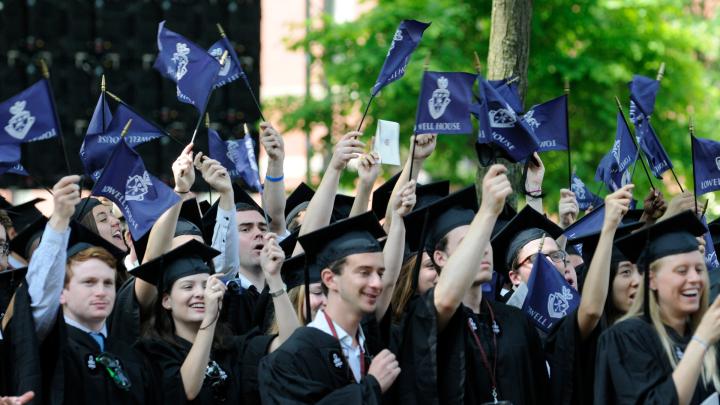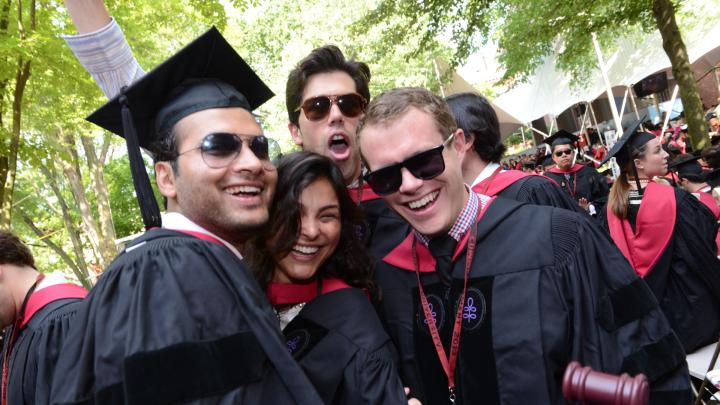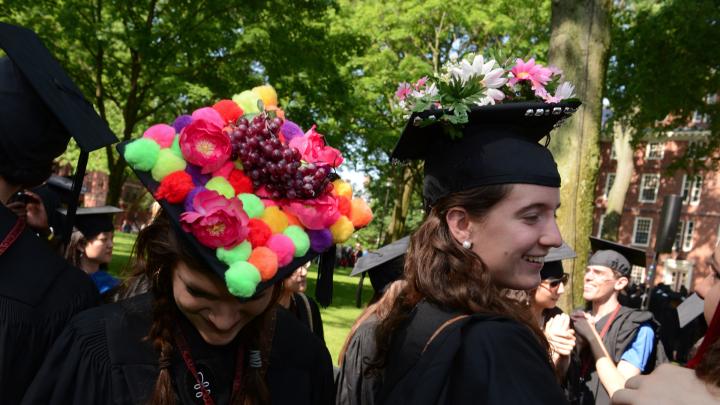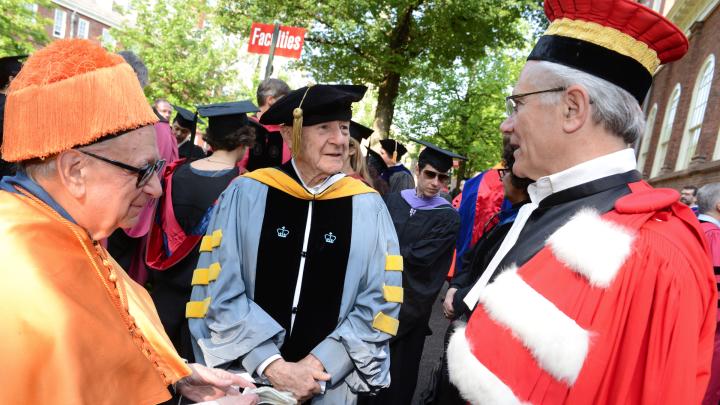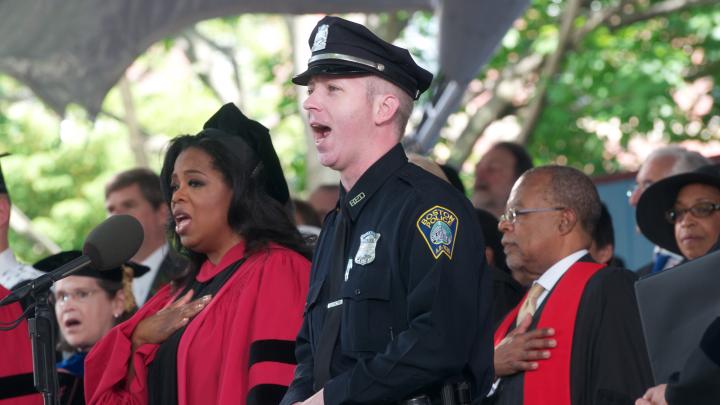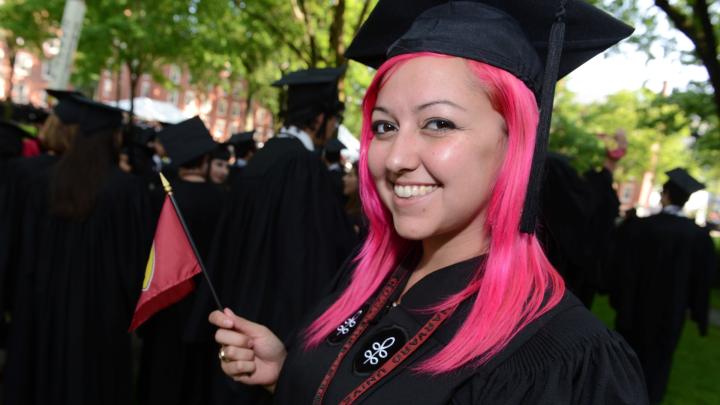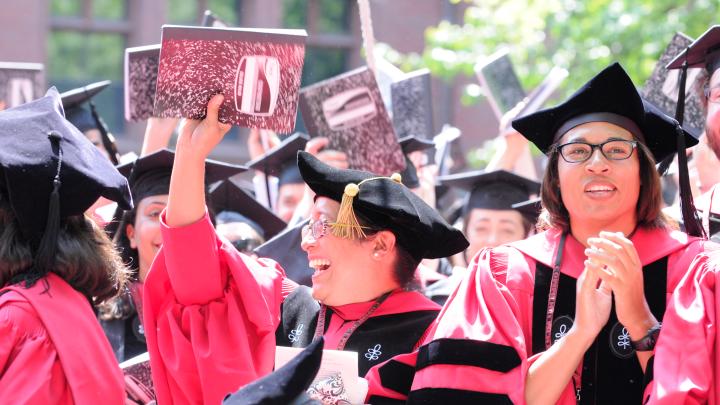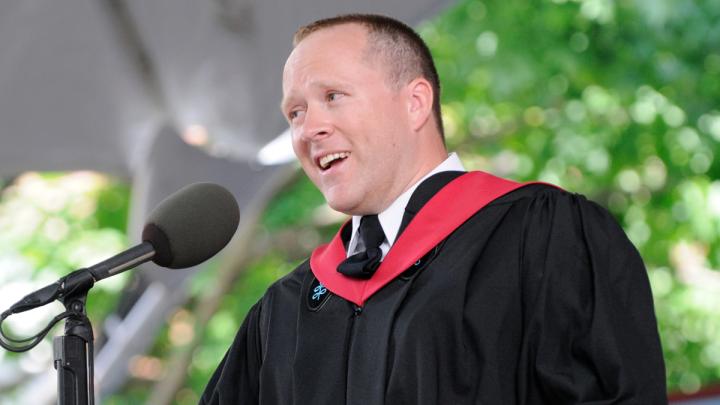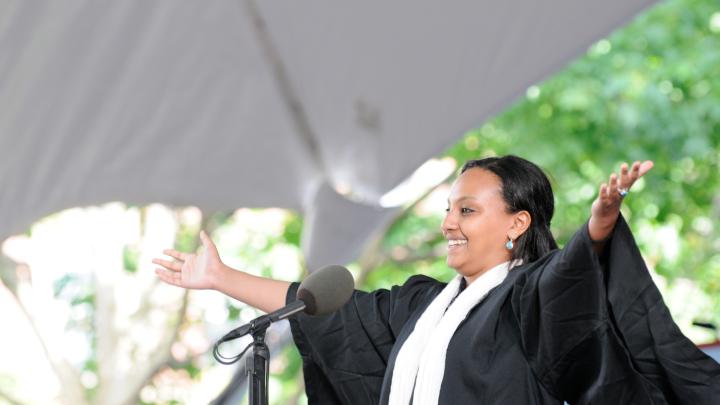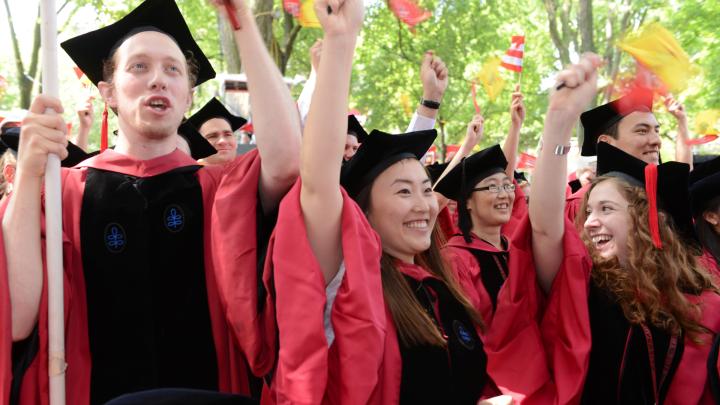As a pre-summer heat wave settled humidly over Greater Boston, Harvard conducted its 362nd Commencement today. During the morning exercises, the University conferred honorary degrees on six men and three women (complete background on each is available here), including José Antonio Abreu (founder of Venezuela’s El Sistema, the music-education and social development program), long-serving Boston mayor Thomas M. Menino, religion scholar Elaine Pagels, and media celebrity Oprah Winfrey. Students received 7,321 degrees and 44 certificates—1,651 of them undergraduates in Harvard College.
The program for the morning exercises is posted here.
Boston police officer Stephen McNulty led the singing of the national anthem—a nod to the Boston Marathon bombing on April 15 that brought the horrors of terrorism to the metropolitan area and the wider world. President Drew Faust then called for a moment of silence for the victims of that violence, and for the victims of the Oklahoma tornadoes last week. Chaplain of the day Stephanie Paulsell, Houghton professor of the practice of ministry studies, then offered the opening prayer.
The traditional student orations (now called “addresses,” perhaps to make them seem less forbidding and to encourage more applicants in the competition to secure one of the parts) were delivered by Fanaye Yirga ’13 (the Latin Salutatory—and its English translation); Felix de Rosen ’13 (the Senior English Address); and Jon Murad ’95, M.P.A. ’13 (the Graduate English Address). Read Harvard Gazette biographies of the speakers here.
“…illam unicam cladem gloriosam Novorum Mexicanorum!”
Yirga, a classics concentrator who was born in New York and grew up in Ethiopia, drew on the Harvard men’s basketball team’s first NCAA tournament victory to deliver this precedent-setting line in her Latin Salutatory, “The Four-Year All-Nighter,” where she describe students toiling away on their writing:
Erant nonnulla non insana, erant nonnulla penitus nugalia, sed usque scribebamus, per procellas et nivales et pluviales, per fluoris electrici abruptiones improvisas, per occupationes disputatas, per crapulas immites, per clades innumerabiles amicorum Novi Portus atque per illam unicam cladem gloriosam Novorum Mexicanorum!
(“Some of it was not unsound, and some of it was utter nonsense, but we went on writing, through fierce blizzards, savage hurricanes, unexpected blackouts, controversial occupations, cruel hangovers, countless defeats of our friends in New Haven, and that single glorious defeat of those in New Mexico.”)
“Clocks tell time.”
de Rosen, a government concentrator who was born in Paris and grew up in Philadelphia, tapped into the sentiments of passing time and new beginnings by summoning the memory of Charles A. Ditmas Jr., 1910-2001, long the keeper of the clocks of Harvard College. In his speech, “Listening to Time,” he said (after noting, “This feels a little bit different from speaking in section”):
What strikes me about Charles’s relationship with clocks is that he never worried about what seems so obvious to the rest of us: clocks tell time. They symbolize the unceasing passage of time. Every second forward is a unique moment lost to eternity.
Charles was unfazed by the passage of time because he was enraptured by the inner engineering of the clock and the elegance of its casing. That is why he hated battery clocks and electric clocks. They had no soul, no feeling. They were more precise, truer to time, but he could not talk to them.
You see, Charles simply liked the feeling of a clock’s tick, its texture, and the story it told. If you probed him further and asked him why he liked these, he might shrug and say “I just do.” One could not rationalize it. It was simply intuitive—a feeling.
Now, what does this have to do with Commencement? Today, the word commencement refers to a beginning. But in fact, the word commencement comes from the Latin “com”—together—and “initiare”—to initiate. We are being initiated together, thrown forward into new worlds. It’s easy to see this day as one would look at a clock. Clocks tell time. Commencement tells time: the passage from one age to another. It is harder to see a clock and our Commencement as outside of time. It is hard because we seek to understand time, to control it. But the passage of time, like much in life, lies beyond us. It lies beyond our reach.
We do not control where we are born, we do not control when we are born, and death is not a choice. Fear, anxiety, and hope are only natural responses to the utter vastness and uncertainty of the universe. These feelings flow inside all of us, and they should guide us. On this day of Commencement, we can listen to them. Amidst the trees, the red bricks, with the infinite sky above us us, we can listen to their breath and they can lead us to unexpected places. Indeed, if we listen carefully enough, even the plainest things can become the source of infinite joy and wonder: a clap of thunder, the beating of your heart, even an old clock.
“When you’re a cop…there’s a definite value in breakaway neckwear.”
Mid-career Harvard Kennedy School student Jon Murad, a 1995 College graduate and now a New York police detective (read a New York Daily News account here), spoke about service in his Senior English Address, “In Praise of Clip-on Ties”:
My name is Jon Murad, and this is a clip-on tie. Not the height of fashion, perhaps, but when you’re a cop—as I am—there’s a definite value in breakaway neckwear, especially if someone’s trying to choke you. On Monday, when I report back to the New York City Police Department after this academic sojourn, I’ll probably be assigned to a precinct in the Bronx or Manhattan North. And I’ll put this on and go forth to try to make my corner of the city a safer, fairer place.
Reflecting on his own journey from his College graduation 18 years ago, he said:
…if you’d told me then that I’d end up a cop in the Bronx, I’d have slooowly backed away. Harvard graduates don’t take jobs like that; they become ibankers and start-up entrepreneurs. There are expectations.
And then he explained the different paths of service open today:
The first of Harvard’s eight U.S. presidents, writing to the second, his son, drove this home: “You come into life with advantages which will disgrace you if your success is mediocre. And if you do not rise to the head not only of your profession, but of your country, it will be owing to your own laziness, slovenliness, and obstinacy.” I know, right? Something tells me that John Adams would have had been unenthused if John Quincy had come home with a clip-on tie.
But somewhere inside, that sentiment is not alien to any of us. The distinguished fellowship, with its scientists and statesmen, sets a high bar. But let us remember this: it is incomplete without those among us whose paths will not be written in history books nor on Wikipedia pages. For many of you, perhaps most of you, the lives you’ve envisioned aren’t necessarily the ones you’ll lead. And that’s not a bad thing. My hope today, in this time before the diplomas and the family photos and the deservéd revels, is to remind us all—to assure us all—that there is as much stature in our being social workers and teachers, soldiers and preachers, nurses and, yes, even cops, as in being presidents and poets laureate.
A lot of you know this already, but I did not, when first I sat out there. And now? Well, I’m probably not the only municipal cop in the country with two Harvard degrees, but I’m surely in a tiny cohort, and that’s not a boast, it’s a lament. If there is something special about this place and the lessons we have learned here, and I believe there is, then America—the world—needs people like you in these roles. Because John Adams was dead wrong. Success doesn’t mean rising to the top, it means changing the world. And here’s the secret: Everyone changes the world. Everything ripples. It’s how we do it that counts.
So how do we do it? Do you choose a job that serves others, as many of you have already done? Do you sign up to be a Big Sister? Do you check out Citizen Schools? Do you volunteer for hospice? Yes. The answer is yes. These things are the tab for your coming here, when others could not. These things matter. They may even be better than making piles of money, although, as a civil servant, I wouldn’t really know. But I do know this: the crimson H you’ve earned today marks you, like a Cantab Hester Prynne. Sometimes you’ll shy from it, as when you disingenuously say you went to school “in Boston.” And other times you’ll drop the H-bomb with aplomb. Regardless, the crimson letter and the expectations that come with it are yours. And so is the way you choose to change the world. For the time being, I’ll be doing it one radio run at a time, while wearing a clip-on tie. You can wear whatever neckwear you like, or none at all, but let us go forth, and serve as we can.
Murad received a standing ovation—rare for the student speakers.
The Conferring of Degrees—and Hugs
President Drew Faust then prepared to confer degrees, as Provost Alan Garber called on the deans of the University’s schools.
New Graduate School of Arts and Sciences dean Xiao-Li Meng, presenting the Ph.D. candidates for the first time, confessed, “This is more nerve-wracking for me than presenting my own thesis defense.” He hoped to do well, he said, so the candidates would indeed graduate (he did)—and so he could earn a hug from Oprah Winfrey. By the time he reached the master’s degree candidates moments later, he reassured them that they should not worry: he had, by then, practiced. And Oprah duly conferred the hug.
School of Engineering and Applied Sciences dean Cherry Murray began, “I’d like a hug, too.” Oprah, a hugging machine, obliged.
When Michael Shinagel—the long-time Extension School dean, who is retiring—approached to present his candidates, Provost Alan Garber recognized his service. Shinagel introduced himself as “the lame-duck dean” for extension studies.
Medical school dean Jeffrey S. Flier, saying “I’m not going to end this tradition,” also walked over for a hug. Jules L. Dienstag, the dean for medical education, broke the tradition by crossing to “shake the hand of our mayor,” Thomas Menino (the medical school is located in Boston). He then shook Oprah’s hand. Divinity dean David N. Hempton invoked a higher power to spare her yet another hug. Law School dean Martha Minow joked about the microphone’s being too high for her forceful presentation.
When the education students’ turn came, Garber recognized Kathleen McCartney, who is leaving the Graduate School of Education to become president of Smith College.
David Ellwood then rose to present the government-degree candidates, one-upping his colleagues by introducing himself as dean of the Harvard Kennedy School “and as a previous guest on the Oprah Winfrey Show,” conferring his own sort of air-hug in words to the honored guest.
When it came time for the undergraduates, Provost Garber spoke “with warm appreciation for her devoted leadership and service” of Harvard College dean Evelynn M. Hammonds, whose decision to step down after a particularly taxing year was announced just this past Tuesday. Oprah joined President Faust and Garber in wading into the summa cum laude graduates, who are summoned along with the senior class marshals to “draw near” the dignitaries seated in front of Memorial Church.
The Honorary Degrees
The honorands were recognized in this order:
- Donald R. Hopkins, M.P.H. ’70, public-health leader, who has helped to nearly eradicate Guinea worm disease, among other scourges, Doctor of Science.
- JoAnne Stubbe, Novartis professor of chemistry and professor of biology at MIT, a leading researcher on the enzymes that regulate DNA replication and repair, Doctor of Science.
- Sir Partha Dasgupta, Ramsey professor emeritus of economics, University of Cambridge, who has pioneered the study of the interface between poverty and environmental resources, Doctor of Laws.
- José Antonio Abreu, pianist and educator, creator of El Sistema in his native Venezuela, Doctor of Music.
- Lord Robert M. May, professor, Oxford University, a leading scholar in the application of mathematics to problems in ecology and biodiversity, Doctor of Science.
- Elaine Pagels, Ph.D. ’70, Paine Foundation professor of religion, Princeton University, a preeminent scholar of Gnosticism, early Christianity and its orthodoxies and heresies, and late antiquity, Doctor of Laws.
- C. (Clemmie) Dixon Spangler Jr., M.B.A. ’56, entrepreneur and philanthropist, Doctor of Laws.
- Thomas M. Menino, mayor of Boston, Doctor of Laws. Biting his lip, Menino, who has faced numerous health challenges, rose to his feet for his citation, and then silently mouthed his thank you to Faust after it was read.
- Oprah Winfrey, global media figure, Doctor of Laws. Her citation said she merited a "standing O." Secretary of the University Marc Goodheart, who hands over the honorary degrees, accompanied Oprah's with a hug of his own.
The Morning Exercises Conclude
As fanning of faces with Commencement programs and the occasional mortarboard spread among the throng (the temperature having risen steadily from 76 degrees at 9:45 a.m. toward a forecast 94), the morning exercises concluded with a benediction delivered for the first time by Jonathan L. Walton, the new Pusey minister in the Memorial Church and Plummer professor of Christian morals, who assumed those offices last July 1. He urged all to "be led by your faith, never by your fears"—and to "wear a clip-on tie." He was blessed, in turn, by the final Oprah hug of the formal proceedings.
The sheriff of Middlesex County having called for adjournment, the exercises finished with precision at 11:32 a.m.
